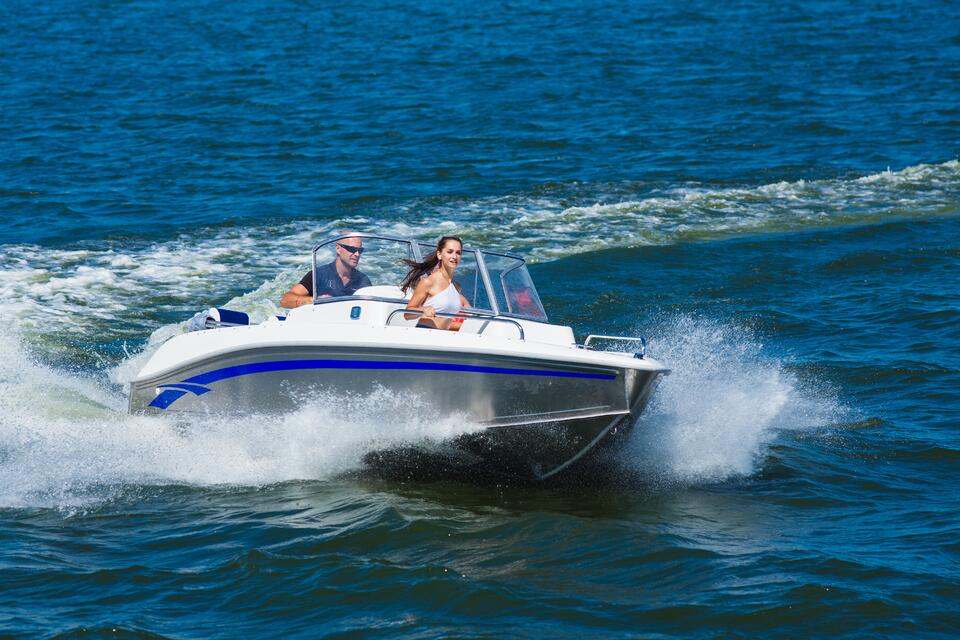Knowledge Center
Everything You Need to Know to Have a Safe Boating Season
 Every summer, our team gets calls from customers after a fun weekend on the water takes a turn for the worse. Often, these accidents could have been prevented with just a few simple precautions. Here are a few of our best tips, whether you're on your way to the water, in the water, or boating at night.
Every summer, our team gets calls from customers after a fun weekend on the water takes a turn for the worse. Often, these accidents could have been prevented with just a few simple precautions. Here are a few of our best tips, whether you're on your way to the water, in the water, or boating at night.
Top Tips for Boat Trailer Safety
There are many reasons to love the sport of boating – it can be relaxing, exciting, entertaining and even rejuvenating. But hauling a boat on a trailer and launching it at the busy launch ramp can have its challenges. In fact, it can be downright stressful and dangerous and is often wrought with mishaps.
To help make sure you can haul your boat to its destination and into the water smoothly, follow this safety checklist before you tow your boat trailer:
- Coupler, hitch and hitch ball are of the same size
- Coupler and safety chains are safely secured to the hitch of the tow vehicle
- All fasteners are properly tightened
- Boat is securely tied down to trailer (winch line is not a tie down)
- Wheel lug nuts are properly tightened
- Wheel bearings are properly adjusted and maintained
- Load is within maximum load carrying capacity
- Tires are properly inflated
- All trailer lighting is working properly
- Trailer brakes are properly adjusted and working (if trailer is so equipped)
- Brakes and additional equipment meet all local and state requirements
At World Insurance Associates LLC, we want your boating adventures to be enjoyed on the water instead of experienced with frustration on the boat ramp or on the road.
Don’t Let an Accident Wreck Your Fun!
Once you make it to your destination and have your boat in the water, follow these tips for an accident-free boating experience.
Life preservers aren’t just for kids. It’s not enough to just have life jackets on board — wear them! In an accident, people rarely have time to reach for a life jacket. This rule applies to adults, not just children: More people in their 30s die in boating accidents than any other age group. Life vests have come a long way in style. Today, you can even get vests for your water-loving dog!
Watercraft Insurance
Most home insurance policies have limited coverage for boats. If you own a boat, watercraft insurance is your best bet: It covers theft, damage, and injuries or accidents while you’re on the water, as well as some of your expensive watersports gear.
Watch the back of the boat. Carbon monoxide kills in minutes. So tell your passengers where your exhaust pipes are located and turn off your engine when people are in the water, and don't let passengers "ski" or “teak-surf” by holding on to the back of the boat. Both Washington and Oregon made teak-surfing illegal in the last few years, after several tragic deaths. Carbon monoxide detectors are standard on most new boats; older boats install devices for less than $100.
Alcohol and boating don't mix. More than 50 percent of drownings result from boating incidents involving alcohol. You don’t drink and drive, so don’t boat and drive.
Boats need TLC too. When you're out on the water, make sure your gas tanks are vented and bilges are free of vapors, oil, waste and grease. Carry a charged fire extinguisher. Have your boat's operating systems checked yearly by a certified marine technician. The Coast Guard Auxiliary and United States Power Squadrons also offer free vessel safety checks.
Experience counts! The U.S. Coast Guard says that operator errors account for 70 percent of all boating accidents. Make sure anyone who drives your boat is properly trained. You may be eligible for boat insurance discounts if you complete a safety course with the Coast Guard Auxiliary or U.S. Power Squadrons.
Shedding Some Light on Boating in the Dark
A warm evening can be a wonderful time for a cruise on your boat. But, just like when you’re driving a car after sundown, it’s important to make some adjustments to keep yourself and others safe.
Below are some tips to ensure you’ll make it back to shore to enjoy the rest of your evening.
Before You Get on the Boat
Know where you’re going. Everything looks different when it’s dark, so stick to familiar places when you’re on the water at night. A GPS device and a good old-fashioned compass are good things to have on hand to help with navigation.
Make sure someone else knows where you’re going. Give a “float plan” to a trusted friend or family member. Include your intended route, your boat’s registration details and description, the names of passengers and when you plan to return. Nobody will know if you’re missing if they don’t know you’re gone!
Have the right safety equipment. You need navigation lights that work (test them before you go), a horn or other sound-producing device, a radio, a flashlight, flares and fire extinguishers. And don’t forget those life jackets — for everyone on board.
Check the forecast and your fuel. Getting caught in a storm or running out of fuel can be even more dangerous and troublesome at night. Visibility is already hampered, and a storm will only make things worse. If you’re stranded without fuel, help may take longer to respond.
Once You’re Afloat
Watch your speed. You can’t see as well at night, and there’s no road to give you an indication of where other vehicles and obstacles might appear suddenly. Take it slow, and always obey speed limits.
Watch the lights. You should already know what the lights on other boats indicate — now you have to look for them. Lights from anchored or drifting boats can be particularly difficult to differentiate from lights onshore.
Avoid distractions — and drinking. Drinking while operating a boat puts you and other people at risk, so don’t do it. And, since your vision is limited at night, sound becomes more important. A loud stereo could drown out the horn of an approaching boat.
Above all, remember that it’s not just you out there. There may be all kinds of vessels in the water, depending on where you are, from commercial ships to kayaks. So be mindful of the right-of-way rules, keep your distance when passing others and be courteous.
There’s room for everyone on the water, as long as you keep an eye out for each other!
This article is not intended to be exhaustive, nor should any discussion or opinions be construed as legal advice. Readers should contact legal counsel or an insurance professional for appropriate advice.
We’re ready to help you
protect what matters most
Discuss your options for protecting your reputation and your business.


